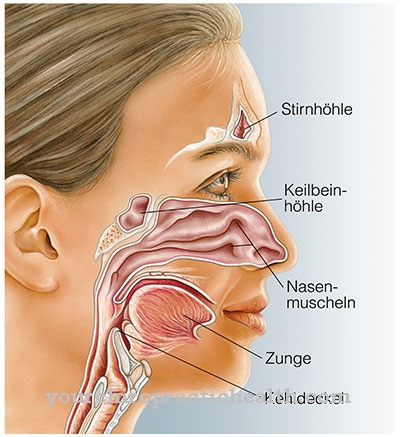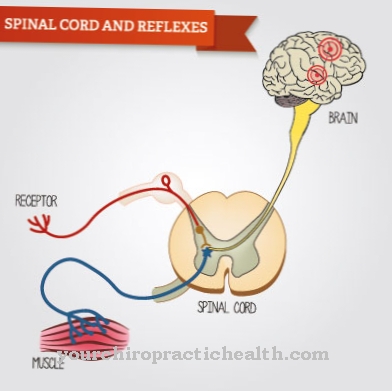You can read more and more often in the daily press that mental illness are on the rise in the population. Environmental experts know that the statistical values on mental illnesses are not meaningful as long as environmentally ill and people with previously inexplicable multisystem illnesses are included as mentally ill. But it is true that our modern life is increasingly affecting the soul.
What are mental illnesses?

© Annett Seidler - stock.adobe.com
Mental illnesses are more and more common as a result of loneliness, increased work pressure or a lack of stress compensation. They can be favored by genetic disposition, environmental factors, substance abuse, parental violence or other negative experiences.
A definition of mental illness is difficult because mental illnesses have different clinical pictures. Mental illnesses, however, have one place in common: the soul. From when mental illnesses have to be treated is assessed differently. If there is a "significant deviation" in the areas of feeling, thinking, acting and experiencing, mental illnesses are assumed to be the cause.
Physical symptoms can hide the fact that the illness is psychological. One then speaks of a somatization. The concept of illness is problematic because everyone experiences and feels differently. Often physical symptoms are attributed to the psyche. In this case, time is wasted in useless therapy sessions.
causes
The cause of mental illness are repressed or unconscious fears, experiences or conflicts that may have arisen in early childhood. They often only make themselves felt years later through mental illnesses such as depression or anxiety disorders.
In many cases, the causes of mental illness are multi-causal, but in others they can be traced back to a dramatic experience such as early childhood trauma. People process stressful life experiences differently. Mental illness occurs when processing is inadequate and the trauma cannot be compensated for.
Genetic, diet-related, abuse-related factors or factors such as low stress resistance, excessive demands or inability to deal with conflict can also trigger mental illness. Most mental illnesses have their own causal profile. Some people are more prone to mental illness than others.
Symptoms, ailments & signs
The symptoms of mental illness can vary widely. It always depends on what mental illness it is. During a psychosis, for example, completely different symptoms occur than during an eating disorder, for example. However, there can be overlaps such as depressive episodes.
However, there are abnormalities that generally suggest a mental illness, such as indefinable or unfounded fears, constant preoccupation with illnesses and one's own body. Regular doctor or even emergency medical visits, during which nothing is found, can also indicate that one's mental health is out of balance.
In addition, long-lasting, depressive phases and constantly bad mood can be an indication, as well as irregular or pathological eating behavior. This also includes long periods of hunger or regular vomiting after eating. The case is particularly acute when those affected develop hallucinations or give the impression that someone is in the room even though no one is there.
Sometimes self-harming behavior can occur, which can be accompanied by a sudden withdrawal from normal everyday life. A constant change of partner and frequently changing sexual contacts are increasingly sought after as confirmation of one's own person. In some cases, this goes hand in hand with drug use or regular and massive alcohol consumption.
The affected people mostly have gaps in their memories over a long period of time without the person having taken any mind-altering drugs. If they are asked about the change, they may react with aggression; in the extreme case, there is a tendency towards acts of violence or even crimes.
Diagnosis & course
The diagnosis and the prognosis are different for all mental illnesses. Different mental illnesses are difficult to identify because they manifest themselves through physical symptoms.
The diagnosis must rule out other diseases if the symptoms do not allow a clearly identifiable diagnosis. Exposure to environmental toxins, drug abuse, drug side effects and thyroid disorders can certainly have the same effect as mental illnesses. The anamnesis must also include family history or experiences. Certain mental illnesses can be verified through tests.
The course of the mental illness is different. Depending on the classification in the "International Classification of Diseases" (ICD-10), the courses and treatment options for mental illnesses can be very different. Dementia is different from narcissistic disorder, psychosis, borderline disorder, or clinical depression.
Complications
Mental illnesses often coexist with other mental illnesses and promote the development of physical illnesses. Without proper treatment, the chances of developing more symptoms are particularly high. In addition, there is a risk of chronification without timely therapy.
In this case, the symptoms of mental illness become so strong that they persist permanently or only regress after many years of treatment. However, the course cannot be reliably foreseen in individual cases. Treatment successes are still possible even after several decades.
During treatment with psychotropic drugs, complications can arise from the medication taken. Depending on the extent of the side effects, the attending physician must decide together with the patient whether the advantages or disadvantages of a particular drug outweigh this.
Side effects can occur not only with treatment with psychotropic drugs. Psychotherapy can also have undesirable effects. This includes the lack of therapeutic success, the worsening of symptoms and the emergence of new symptoms. These side effects are mainly possible if the appropriate therapy method has not yet been found for the respective patient.
Many mental illnesses have social complications. The private environment is often stressed due to the illness and professional or school performance can also suffer. Severe mental illness can be a disability that can be officially identified.
When should you go to the doctor?
If the sick person is aware that everyday life with family, job and free time is becoming more and more difficult to cope with, they will be better able to accept the help of a specialist.
If the following symptoms persist for more than four weeks, seek professional help:
- Getting up in the morning is difficult because total physical and psychological exhaustion spreads.
- Inexplicable fears make it almost impossible to do necessary chores like household chores or running errands.
- Social contacts are reduced or broken off.
- Seemingly unsolvable problems, negative thoughts and extreme mood swings dominate everyday life.
- The person concerned is depressed, irritable or even aggressive.
- Insomnia and a great deal of inner restlessness occur.
- The general physical condition is poor. The affected person tries to calm himself down with medication or alcohol.
An initial discussion with a trusted doctor or your family doctor is useful. As a rule, he or she knows the person concerned and their immediate environment and can refer them to an appropriate specialist if necessary.
Treatment & Therapy
Nowadays, mental illnesses can be treated preventively if there is a familial tendency towards addictions or psychoses. In the case of genetic disease risks, early detection is important. The treatment will look different depending on the clinical picture.
Many mental illnesses can be treated with medication, others better with psychotherapy. Psychotropic drugs or sedatives can be used to influence the brain metabolism in the event of a lack or excess of certain messenger substances. The problem is that therapy for mental illnesses such as depression can take a long time to start to take effect. For some therapies, such as anxiety disorders, you have to wait several years before you are accepted into a clinical program.
Before a patient is ready, he has often already built up a longstanding level of suffering that needs to be remedied more quickly. Delaying therapy can also have fatal consequences in the case of psychologically induced sleep disorders. The side effects of antidepressants or the addictive potential of certain drugs are also problematic. You have to carefully weigh up which therapeutic approaches make sense for certain mental illnesses in order not to cause even more damage.
You can find your medication here
➔ Medicines to calm down and strengthen nervesprevention
In the case of psychosomatic illnesses, completely different considerations make sense. Here mental and physical symptoms have to be treated together. The physical symptoms are by no means imaginary, but certain illnesses can actually develop due to constant psychological stress, certain addictions or incorrect behavior.
Aftercare
People affected by mental illness are often lifelong with their illness. Even after a completed therapy or after an inpatient stay in a psychiatric hospital, a mental illness is in many cases not completely eliminated, but the patient has found ways to cope better with his depression or anxiety disorder in everyday life.
If there is a mental illness, consistent follow-up care is not only advisable, but a necessity. Affective disorders such as depression are often associated with an increased risk of suicide, especially if the person affected is still comparatively unstable even after therapy. In such cases, failure to provide follow-up care could be life-threatening.
As part of the follow-up care, a psychologist or psychiatrist accompanies the sick person when they return to everyday life (after a stay in hospital). If the patient experiences stigmatization from those who are not affected, this experience can be brought up during follow-up care.Follow-up care is also necessary for crisis intervention in order to prevent relapses or a significant deterioration in the condition. In the long term, regular aftercare aims on the one hand to stabilize the sick person and on the other hand to improve their quality of life. This enables him to cope with his everyday life more easily.
You can do that yourself
A doctor should be consulted at the slightest suspicion of suffering from a mental illness: the sooner the therapy starts, the better the chances of success. In phases of great psychological stress, medical treatment is recommended if symptoms such as nervousness, difficulty falling asleep and staying asleep, tiredness and listlessness do not improve or even worsen even after physical and mental rest.
In a life crisis it is important to talk to friends, family or a self-help group. If this is not enough to restore mental stability, medical help should be sought. A visit to the doctor must not be postponed if there is a risk of harming yourself or others. A change in eating habits associated with massive weight loss must also be clarified.
Further signs of a mental illness that requires treatment can be inexplicable mood swings that have persisted over a long period of time, poor concentration, aggressiveness, irritability and joylessness. A wide variety of physical complaints such as headaches, gastrointestinal disorders, back pain and heart problems can also be attributed to psychological causes: If clinical examinations do not reveal any physical causes, psychological counseling should be considered. The first point of contact is usually the family doctor, who can arrange for a referral to a specialist in psychiatry or a psychotherapist, depending on the symptoms.





.jpg)


















.jpg)



